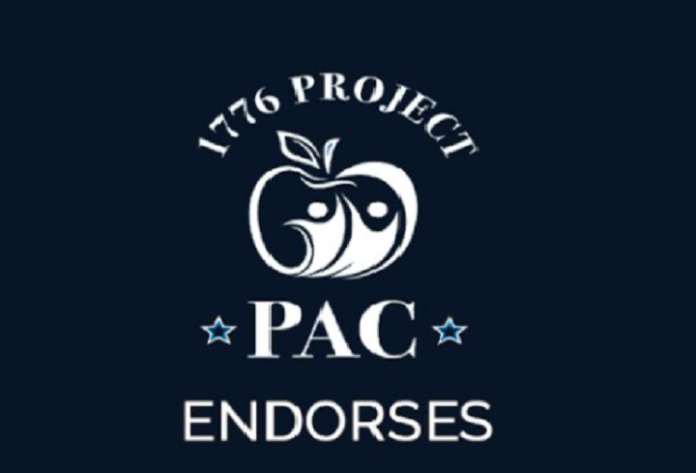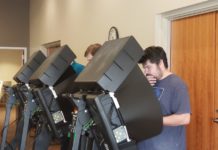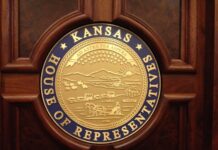A federal PAC supporting school board candidates in Kansas and nationally who oppose critical race theory raised almost $300,000 in the third quarter, a new campaign report shows.
The 1776 Project PAC, which is backing candidates in seven states including Kansas, raised $289,544 during the quarter that ended on Sept. 30, according to the latest report filed with the Federal Election Commission.
It was almost double the $148,337 that the PAC raised during the second quarter.
The PAC’s third-quarter fundraising brings to $437,000 the amount that it has raised for roughly 50 school board races nationally, including 13 in Kansas, the report shows.
The PAC had about $141,000 in the bank leading up to the November general election.
The amount raised for the third quarter is comparable to what a sitting member of Congress from Kansas can raise over the same period, if not more in some instances.
The report filed by the New York-based PAC doesn’t show donations to individual candidates, but rather overall campaign expenses related to fundraising, direct mail and digital marketing.
The report does not reflect how much money is being spent in each state and Ryan Girdusky, who started the PAC, wouldn’t disclose how much is being spent in Kansas.
Girdusky said most of the money was raised through direct mail.
He said he had no expectations of how much would be raised since this kind of effort has not been undertaken before.
“We don’t have a national candidate or a statewide candidate or a congressional candidate. It’s just issues. I literally have zero expectations,” he said.
Girdusky has said previously that the PAC’s strategy is to campaign for slates of candidates in an effort to make its money go further.
The group has endorsed three candidates running for the Lansing School Board, three running in Olathe, three running in Blue Valley, three in Andover and one in the Shawnee Mission School District.
Most of the money flowing into the PAC is coming from California donors who have given $19,300 followed by Texas ($15,350), Florida ($11,070), Alabama ($10,700), Virginia ($10,200) and Massachusetts ($7,250).
The PAC has received $1,525 from Kansans, including $1,000 from Max Rickerson of Chanute and $525 from John Wolhlgemuth of Auburn.
Of the $437,000 raised so far this year, about $291,000 is listed as unitemized because it falls under the $200 threshold for being reported.
About $61,000 of the PAC’s donations come from retirees
Large donors include Walter Curt, CEO of Power Motors Inc. in Mt. Crawford, Va. He has given $5,000 to the PAC so far this year.
Cindy Beers, a retiree from Billings Montana, also has given $5,000 to the PAC so far this year, records show.
Federal campaign records show she has also donated to U.S. Sen. Ted Cruz of Texas and U.S. Sen. Lindsey Graham of South Carolina, among a handful of others.
She also contributed to former Republican U.S. Sens. David Perdue and Kelly Loeffler of Georgia. Perdue lost his re-election bid and Loeffler lost a special Senate election.
Robert Robinson, a neurosurgeon from Birmingham, Alabama, also has given the PAC $10,000 to date, records show.
State laws governing campaign disclosure for school board races are relatively weak.
There are no limits on campaign contributions to school board candidates in Kansas except for Wichita, which is large enough to fall under the purview of the State Ethics Commission.
And the state campaign finance law doesn’t apply to PAC expenditures for school board races outside of Wichita.
However, there is a separate state statute which says that every committee or association that advocates for the election or defeat of a candidate in a school district – except Wichita – must track the money it receives and spends.
The law says the report must be filed with the election officer of the county in which the organization has its headquarters.
It’s up to local prosecutors to enforce the law although it’s unclear how it would apply to an out-of-state group spending money in a local election, however.
State laws for campaign disclosure for a school board election are conflicted when it comes to revealing who pays for ads.
The PAC, under the law, isn’t required to indicate on its campaign material who paid for an ad unless it’s for television or radio regardless of whether it’s for a candidate, a bond issue or another ballot question.
However, if it’s for printed material – fliers, brochures or political fact sheets – a “paid-for” attribution is only required for something like a bond issue or a ballot question. The law doesn’t mention anything about candidates.
Critical race theory has bubbled up in this year’s school board races and has been one of the hottest issues in Kansas politics this year.
School districts across the state have pushed back, with many flatly saying the topic is not taught on their campuses, although critics have tried to show otherwise.
The issue of critical race theory took on heightened attention this week when the chair of the Senate Education Committee told the state school board that four bills are in the works to address the issue next session.
Critical race theory, developed by legal scholars more than 40 years ago, suggests that racism is more than just an individual bias but is rooted in policies for criminal justice, health care and housing, among other things.
Lawmakers advocating for limits on critical race theory nationally say it’s being taught in a way that fosters divisions among students, although school districts are rebutting the idea that it’s part of their curriculum.
“Having talked to many of the local school board candidates and attending some of these candidate forums, that is the No. 1 question…they’re asked: Where are you on critical race theory? What do you think should or shouldn’t be taught in our classroom,” Republican Sen. Molly Baumgardner told the board on Wednesday.
“I am going to implore that as a board you direct your staff to to get real about where we are on a critical race theory in our schools,” she said.
















